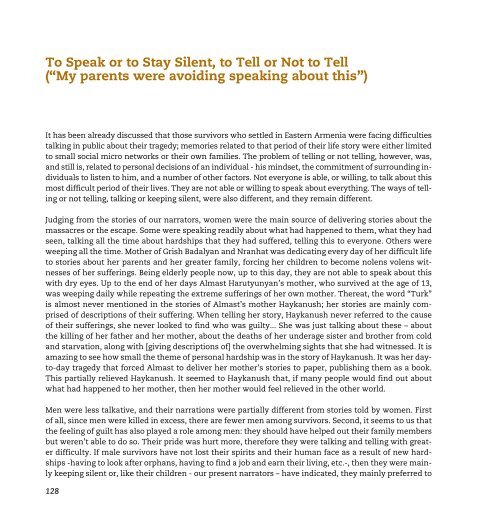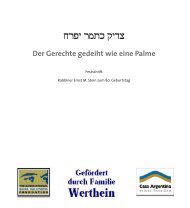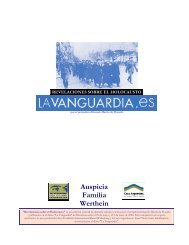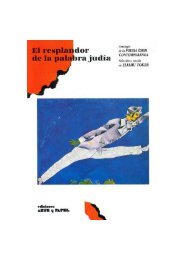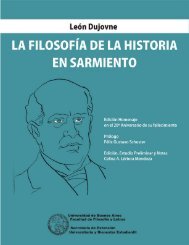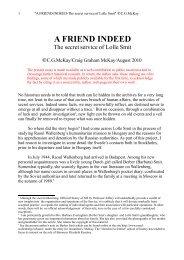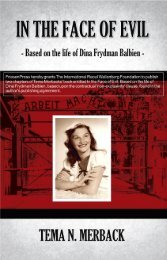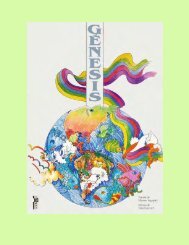To Speak or <strong>to</strong> Stay Silent, <strong>to</strong> Tell or Not <strong>to</strong> Tell(“My parents were avoiding speaking about this”)It has been already discussed that those survivors who settled in Eastern Armenia were facing difficultiestalking in public about their tragedy; memories related <strong>to</strong> that period of their life s<strong>to</strong>ry were either limited<strong>to</strong> small social micro networks or their own families. <strong>The</strong> problem of telling or not telling, however, was,and still is, related <strong>to</strong> personal decisions of an individual - his mindset, the commitment of surrounding individuals<strong>to</strong> listen <strong>to</strong> him, and a number of other fac<strong>to</strong>rs. Not everyone is able, or willing, <strong>to</strong> talk about thismost difficult period of their lives. <strong>The</strong>y are not able or willing <strong>to</strong> speak about everything. <strong>The</strong> ways of tellingor not telling, talking or keeping silent, were also different, and they remain different.Judging from the s<strong>to</strong>ries of our narra<strong>to</strong>rs, women were the main source of delivering s<strong>to</strong>ries about themassacres or the escape. Some were speaking readily about what had happened <strong>to</strong> them, what they hadseen, talking all the time about hardships that they had suffered, telling this <strong>to</strong> everyone. Others wereweeping all the time. Mother of Grish Badalyan and Nranhat was dedicating every day of her difficult life<strong>to</strong> s<strong>to</strong>ries about her parents and her greater family, forcing her children <strong>to</strong> become nolens volens witnessesof her sufferings. Being elderly people now, up <strong>to</strong> this day, they are not able <strong>to</strong> speak about thiswith dry eyes. Up <strong>to</strong> the end of her days Almast Harutyunyan’s mother, who survived at the age of 13,was weeping daily while repeating the extreme sufferings of her own mother. <strong>The</strong>reat, the word “Turk”is almost never mentioned in the s<strong>to</strong>ries of Almast’s mother Haykanush; her s<strong>to</strong>ries are mainly comprisedof descriptions of their suffering. When telling her s<strong>to</strong>ry, Haykanush never referred <strong>to</strong> the causeof their sufferings, she never looked <strong>to</strong> find who was guilty... She was just talking about these – aboutthe killing of her father and her mother, about the deaths of her underage sister and brother from coldand starvation, along with [giving descriptions of] the overwhelming sights that she had witnessed. It isamazing <strong>to</strong> see how small the theme of personal hardship was in the s<strong>to</strong>ry of Haykanush. It was her day<strong>to</strong>-daytragedy that forced Almast <strong>to</strong> deliver her mother’s s<strong>to</strong>ries <strong>to</strong> paper, publishing them as a book.This partially relieved Haykanush. It seemed <strong>to</strong> Haykanush that, if many people would find out aboutwhat had happened <strong>to</strong> her mother, then her mother would feel relieved in the other world.Men were less talkative, and their narrations were partially different from s<strong>to</strong>ries <strong>to</strong>ld by women. Firs<strong>to</strong>f all, since men were killed in excess, there are fewer men among survivors. Second, it seems <strong>to</strong> us thatthe feeling of guilt has also played a role among men: they should have helped out their family membersbut weren’t able <strong>to</strong> do so. <strong>The</strong>ir pride was hurt more, therefore they were talking and telling with greaterdifficulty. If male survivors have not lost their spirits and their human face as a result of new hardships-having <strong>to</strong> look after orphans, having <strong>to</strong> find a job and earn their living, etc.-, then they were mainlykeeping silent or, like their children - our present narra<strong>to</strong>rs – have indicated, they mainly preferred <strong>to</strong>128
speak <strong>to</strong> each other. Questioned by their children, they either replied very laconically, or mainly spokeabout their participation in the Armenian freedom movement.Both subject and methods of delivering the memories by men and women were different also at a laterstage, when children-survivors had grown up. Having grown up, boys used <strong>to</strong> deliver in writing, ratherthan narrating. <strong>The</strong>y used <strong>to</strong> write it “just for themselves.” On the one hand this can be explained by thefact that, while the subject was a forbidden issue, there were difficulties with distributing these writtenmaterials, with making them public; on the other hand, perhaps, by their motivation <strong>to</strong> write. Writingthings down is perhaps a way of partially getting rid of inwardly accumulated hardships.Girls, after growing up, were telling details about even the most inhumane events, while men preferredavoiding details. This phenomenon exists up <strong>to</strong> this day.In Ashnak village of Talin, Elya Davtyan recounted in detail the brutal s<strong>to</strong>ry that happened <strong>to</strong> her aunt.<strong>The</strong> s<strong>to</strong>ry was about how the young woman (Elya’s aunt) had run away with two kids after the massacreof all her other family members in Hosnut village of Talvorik. “Her name was Doureh. First her daughterdied from hunger on the exodus. <strong>The</strong>n she met askyars (soldiers), who hit her face with the butt ofthe riffle and her teeth were broken in her mouth. <strong>The</strong>n the askyars cut her abdomen making a crossand pulling out her intestines. <strong>The</strong>y thought she was dead and left her. But she had just fainted. <strong>The</strong>nshe recovered and saw that her son was pushing her. She found the strength in herself and put her intestinesback in her tummy, sewed her skin with the needle, tied up her son with her shirt and continued<strong>to</strong> move forward, scrambling and pulling the son. Her son also died in a couple of days. She broughtback the corpse of her son and buried it next <strong>to</strong> her daughter, And then found strength in herself <strong>to</strong> keepmoving. <strong>The</strong>n she found her relatives. Her uncle was Hamze Ptshuk and she lived in his house. When Icame <strong>to</strong> this house as a bride, she was already very old and I was the one <strong>to</strong> take care of her. Every timewhen I was bathing her I carefully washed the wounds on her tummy.” Mrs. Elya was very excited whiletelling this unbelievable s<strong>to</strong>ry, which as we found out was known by everybody in the village. Howeverher husband Derenik Kirakosyan, who was present at the time, was listening <strong>to</strong> what his wife was tellingwith a little frustration and left in the middle of the s<strong>to</strong>ry.Among our narra<strong>to</strong>rs, women were inclined <strong>to</strong> tell the details, whereas men generalized. Women weretalking about those who extended a helping hand and in what situations, telling what words did they use,what clothes did they give them, what food did they provide, where and how did they conceal them, etc.,whereas men were generalizing, in a few words, using expressions like “Turks from the neighboring village”,“women making a racket”, “governmental orders”, etc. Based on the s<strong>to</strong>ries of their relatives womenwere remembering and telling about the cases of brutality, giving the details of sufferings, whereas menspoke of the general phenomenon and carefully avoided references <strong>to</strong> cruelty. Among our narra<strong>to</strong>rs VasakToroyan, for example, several times remembered certain particular events, started <strong>to</strong> tell them, butthen interrupted himself, saying “No, no, it is not appropriate <strong>to</strong> talk about this in the presence of youngpeople”, referring <strong>to</strong> the students who participated in the interview (A.Qeshishyan and S. Haroutunyan).129
- Page 2 and 3:
Published by:Institut für Internat
- Page 5 and 6:
ContentsForeword...................
- Page 7 and 8:
ForewordThe project “Adult Educat
- Page 10 and 11:
Aras, Yasin Aras, Welat Ay, Cenk Ce
- Page 12 and 13:
The main audience of this book is o
- Page 15 and 16:
“Wish they hadn’t left”:The B
- Page 17 and 18:
ed by 1915 and where memories of Ar
- Page 19 and 20:
1915 tends to be represented by int
- Page 21 and 22:
Yet to a large extent, Turkish inte
- Page 23 and 24:
this, we can’t. It’s impossible
- Page 25 and 26:
een very advanced in trade and craf
- Page 27 and 28:
How to Come to Terms with Phantom P
- Page 29 and 30:
It is always you who has to be nice
- Page 32 and 33:
to the way he was raised: “They f
- Page 34 and 35:
empathize with Armenians: “My aun
- Page 36 and 37:
Adil is not the only one marked by
- Page 38 and 39:
ness may be an attempt to overcome
- Page 40 and 41:
dernity and the oral transmission o
- Page 42 and 43:
A soup pot with spoons around itAt
- Page 44 and 45:
What if My Mother is Armenian?Ruhi
- Page 46 and 47:
If I were younger I’d get baptize
- Page 48:
with butter. We’ll serve the impo
- Page 51 and 52:
The time Salih and Gavrik are worki
- Page 53 and 54:
Turkey’s changing context is refr
- Page 55 and 56:
‘It was to be expected.’ And my
- Page 57 and 58:
against one another. The feet of th
- Page 59 and 60:
Fear of Losing a CityZübeyde was b
- Page 61 and 62:
half for me.’ But what do our Mus
- Page 63 and 64:
e discussed when the kids were arou
- Page 65 and 66:
possible by the difference in relig
- Page 67 and 68:
The Charm of AraratMehmet is a 62-y
- Page 69 and 70:
dogs protected the sheep against wo
- Page 71 and 72:
The Story of the “Night People”
- Page 73 and 74:
“I don’t know why, but my grand
- Page 75:
Research in Armenia:“Whom to Forg
- Page 78 and 79: and can generally be located in Tur
- Page 80 and 81: “Whom to Forgive? What to Forgive
- Page 82 and 83: “Private Stories”After the esta
- Page 84 and 85: Recalling MemoriesOral history diff
- Page 86 and 87: In the village of Ujan, where the v
- Page 88 and 89: The home-museum of Gevork Chaush in
- Page 90 and 91: Memorial in the Ashnak village dedi
- Page 92 and 93: other regions are entirely populate
- Page 94 and 95: sources and materials for their mem
- Page 96 and 97: Ergir’s Soil is Strong, Ergir’s
- Page 98: Tatevik, the granddaughterof Mihran
- Page 101 and 102: eral meanings in Armenian -”whole
- Page 103 and 104: The Gospel with Golden Binding of S
- Page 105 and 106: keeps a copper chalice that was bro
- Page 107 and 108: In some families the passports of t
- Page 109 and 110: at that time, Mustafa and Jamal, wh
- Page 111 and 112: People were so frightened to lose g
- Page 113 and 114: naked, they were decapitating every
- Page 115 and 116: Water, Fire, Desert“There was an
- Page 117 and 118: his mother dragged him behind her,
- Page 119 and 120: Many of our narrators mention the R
- Page 121 and 122: In the word-stock of the survivors
- Page 123 and 124: in Kurdish villages, and helping th
- Page 125 and 126: “Well, They Are Human Too”Even
- Page 127: member this well, they said, the el
- Page 131 and 132: Hamze Ptshuk, survived from Hosnut
- Page 133 and 134: “I don’t Know...”Why did this
- Page 135 and 136: “My Dear Almast, Write it Down, W
- Page 137 and 138: took his rifle and ran. The dog fel
- Page 139 and 140: she didn’t tell it to me. In the
- Page 141 and 142: elder guy in this house died and hi
- Page 143 and 144: AH - Turks always killed to get int
- Page 145 and 146: “My Father used to Tell us at Hom
- Page 147 and 148: person... I have never seen him, bu
- Page 149 and 150: gotten what you knew”. So, out of
- Page 151 and 152: a paid Adult Residential Facility,
- Page 153 and 154: It was probably after 60s... My fat
- Page 155 and 156: the Vardevar 1 day . Even if we mak
- Page 157 and 158: that this wasn’t a dream... and..
- Page 159 and 160: was our historical village. Nich, I
- Page 161 and 162: just filming around myself with no
- Page 163 and 164: that person whether I could take a
- Page 165: [Turk. wife]”. In the morning I t
- Page 168 and 169: 4 Albert Mamikonyan,1953, in Kirova
- Page 170 and 171: 11 Almast Harutyunyan,1920, Ujan vi
- Page 172 and 173: 18 Eleonora Ghazaryan.1949, Ashnak
- Page 174 and 175: 26 Nairi Tajiryan,1936, Egypt (Cair
- Page 176: 33 Vazgen Ghukasyan,1933, Ashnak vi


